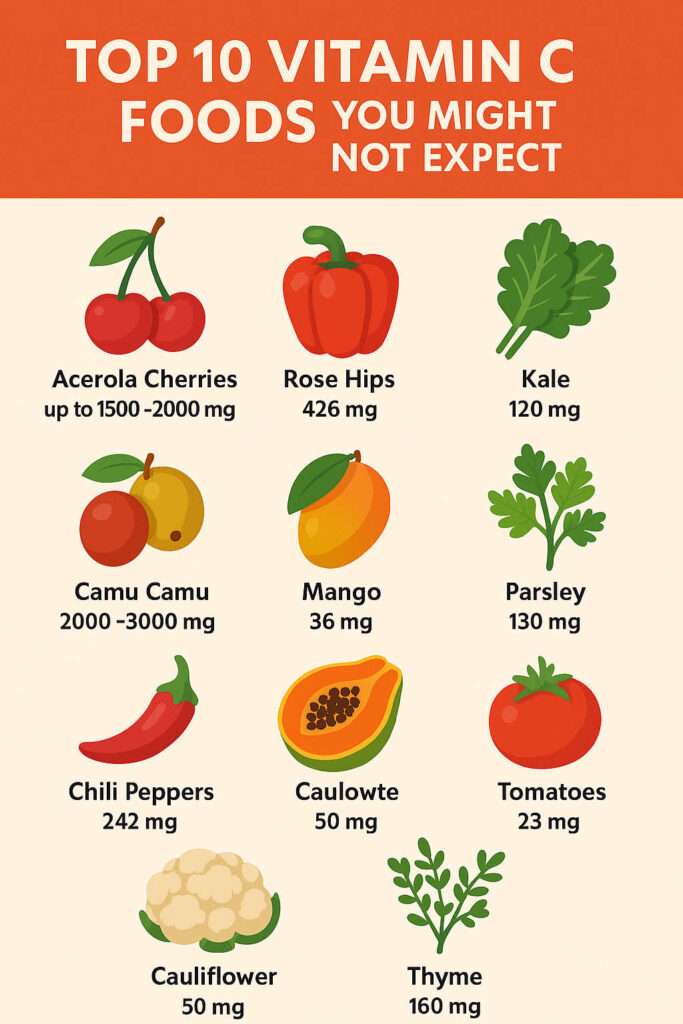The Vitamins and Minerals That Support Energy Indirectly
In the previous blog, we explored the vitamins and minerals that directly participate in ATP production, which is the process
I played Hockey when I was younger and always remembered having Oranges at half-time, wearing them like gum shields afterwards, at that time we were really after the sugar as sports drinks hadn’t really been invented, actually neither had gum shields. We realise now that vitamin C is an immune-supporting, flu stifling necessity. But there is far more to this nutrient than fighting off a cold. From Brain health to collagen production here’s what you need to know about vitamin C, and why getting the right dose matters more than ever.

What the Regulators Say: FSA and EFSA-Approved Claims
According to the European Food Safety Authority (EFSA), which governs health claims in the EU (and remains influential for UK brands via the FSA), vitamin C is allowed to carry the following approved claims:
In short: vitamin C plays a key role in everything from immunity and energy to skin, joints, and brain health — but only if you’re getting enough of it consistently.
Vitamin C and Brain Health: More Than Just an Immune Booster
Vitamin C has long been the go-to nutrient for immunity — the first thing we reach for when we feel a cold coming on. But emerging research suggests its role in the body is far broader and far more essential — especially when it comes to the Brain.
Unlike some vitamins that play supporting roles, vitamin C is deeply embedded in how the brain functions on a daily basis: from producing neurotransmitters to protecting against cellular damage. And yet, it’s often overlooked in conversations about cognitive health.
Antioxidant Protection Where It Matters Most
The brain is highly active, oxygen-hungry, and lipid-rich — a perfect storm for oxidative stress. That’s where vitamin C comes in. As one of the body’s most powerful water-soluble antioxidants, vitamin C protects neurons from oxidative damage caused by free radicals.
Oxidative stress is one of the major contributors to age-related cognitive decline, neuroinflammation, and diseases like Alzheimer’s. By neutralising free radicals, vitamin C helps preserve cellular integrity and slow down degenerative processes.
Fuel for Neurotransmitter Production
Vitamin C is also a key co-factor in the production of neurotransmitters — the chemical messengers that regulate mood, focus, memory, and alertness.
In particular, it’s involved in the synthesis of:
Low vitamin C levels can impair these pathways, potentially leading to symptoms like brain fog, low mood, fatigue, or poor focus — especially in older adults.
Found in Abundance in the Brain
The brain maintains some of the highest concentrations of vitamin C in the body, particularly in areas responsible for memory and decision-making like the hippocampus and cerebral cortex. This suggests just how vital the nutrient is for brain health — even during deficiency, the brain works to conserve it.
Mood, Stress, and Mental Energy
Vitamin C also plays a role in the body’s stress response. It can lower cortisol levels and improve mental strength. In some trials, vitamin C has been shown to reduce fatigue and improve mental clarity in just a couple of weeks.
Backed by Research: Recent Scientific Evidence on Vitamin C and Cognition
A growing body of evidence connects vitamin C status with cognitive performance:

Natural Sources of Vitamin C
Oranges are iconic when it comes to vitamin C, but they’re far from the highest source — just the most popular.
Here’s a more complete list of vitamin C-rich foods, broken down by category:
Superfruits & Potent Plant Sources
Fruits Rich in Vitamin C
Vegetables Rich in Vitamin C
Herbs and Other Plant Sources
Vitamin C is water-soluble and heat-sensitive, so steaming or eating raw preserves more than boiling or frying.
Absorption, NRV, and How Much Is Too Much?
Vitamin C is water-soluble, so your body uses what it needs and passes out the rest — which is why consistent daily intake is more effective than occasional high doses.
Symptoms of deficiency.
Vitamin C deficiency may show up as:
In severe cases, it leads to scurvy — a word you’ve probably only heard in pirate movies.
Scurvy.
Scurvy was a genuine medical crisis among sailors in the 17th and 18th centuries. With no access to fresh fruit or vegetables on long voyages, sailors would develop terrifying symptoms: rotting gums, bleeding, fatigue, and eventually death. A scottish naval surgeon James Lind, conducted the first ever clinical trial in 1747. He gave different groups of sailors different treatments — and only those given citrus fruit (Vitamin C) recovered.
The British Navy eventually mandated lime juice on board, earning British sailors the nickname “limeys”.
Conclusion
Vitamin C has a huge impact on modern health – especially brain health and continuous research points to the importance of it in a balanced diet. To support your immunity, reduce fatigue, or take a proactive step toward long-term cognitive wellness, Vitamin C should for part of your balanced diet with supplementation to ensure daily recommended amounts if necessary.
For vitamin C its important to get the right dose every day. It used to be ‘an apple a day’ but maybe we should change that.
To receive our Newsletter of Research into Vitamins that may help Memory, reduce Tiredness and reduce the chances of Dementia, Alzheimer’s and Cognitive decline please leave your email address below.
In the previous blog, we explored the vitamins and minerals that directly participate in ATP production, which is the process
Feeling tired even after a full night’s sleep? Struggling with afternoon crashes, brain fog, or low stamina during workouts? While
We use cookies to enhance your browsing experience and to analyse our website traffic. We will not share any of your personal details.